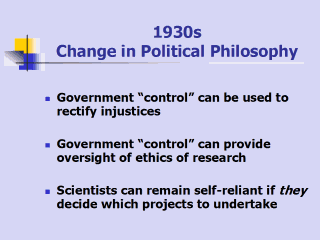 |
The Ransdell Act
marked the point at which scientists began to shift their long-held
philosophy about government funding for science. As the Great Depression of
the 1930s further eroded private funding for science, the scientific
community came to believe that government "control" of science could be
forestalled and scientists could remain self-reliant if the scientists
themselves decided which projects to fund. The concept of peer review of
proposals emerged as the product of this philosophical shift. Scientists
also came to believe that the control that government did exercise over
research could be funneled toward regulation of the scientific enterprise.
Making sure that all citizens had equal access to propose projects and
providing oversight of research ethics were two examples. |
